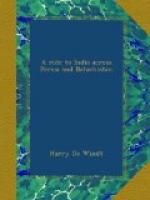CHAPTER I.
Tiflis—Baku.
“Ceci non!”
A spacious apartment, its polished parquet strewn with white bearskins and the thickest and softest of Persian rugs; its panelled walls hung with Oriental tapestries, costly daggers, pistols, and shields of barbaric, but beautiful, workmanship, glistening with gold and silver. Every detail of the room denotes the artistic taste of the owner. Inlaid tables and Japanese cabinets are littered with priceless porcelain and cloisonne, old silver, and diamond-set miniatures; the low divans are heaped with cushions of deep-tinted satin and gold; heavy violet plush curtains drape the windows; while huge palms, hothouse plants, and bunches of sweet-smelling Russian violets occupy every available nook and corner. The pinewood fire flashes fitfully on a masterpiece of Vereschagin’s, which stands on an easel by the hearth, and the massive gold “ikon,” [A] encrusted with diamonds and precious stones, in the corner. A large oil painting of his Majesty the Czar of Russia hangs over the marble chimneypiece.
It is growing dark. Already a wintry wilderness of garden without, upon which snow and sleet are pitilessly beating, is barely discernible. By the window looms, through the dusk, the shadowy shape of an enormous stuffed tiger, crouched as if about to spring upon a spare white-haired man in neat dark green uniform, who, seated at a writing-table covered with papers and official documents, has just settled himself more comfortably in a roomy armchair. With a pleasant smile, and a long pull at a freshly lit “papirosh,” he gives vent to his feelings with the remark that heads this chapter.
There is silence for a while, unbroken save by the crackle of blazing logs and occasional rattle of driving sleet against the window-panes. It is the 5th of January (O.S.). I am at Tiflis, in the palace of Prince Dondoukoff Korsakoff, Governor of the Caucasus, and at the present moment in that august personage’s presence.
“Ceci non!” repeats the prince a second time, in answer to my request; adding impatiently, “They should know better in London than to send you to me. The War Minister in St. Petersburg alone has power to grant foreigners permission to visit Central Asia. You must apply to him, but let me first warn you that it is a long business. No”—after a pause—“no; were I in your place I would go to Persia. It is a country replete with interest.”
I know, from bitter experience of Russian officials, that further parley is useless. Making my bow with as good a grace as possible under the circumstances, I take leave of the governor and am escorted by an aide-de-camp, resplendent in white and gold, through innumerable vestibules, and down the great marble staircase, to where my sleigh awaits me in the cutting north-easter and whirling snow. Gliding swiftly homewards along the now brilliantly lit boulevards, I realize for the first time that mine has been but a wild-goose chase after all; that, if India is to be reached by land, it is not via Merv and Cabul, but by way of Persia and Baluchistan.




